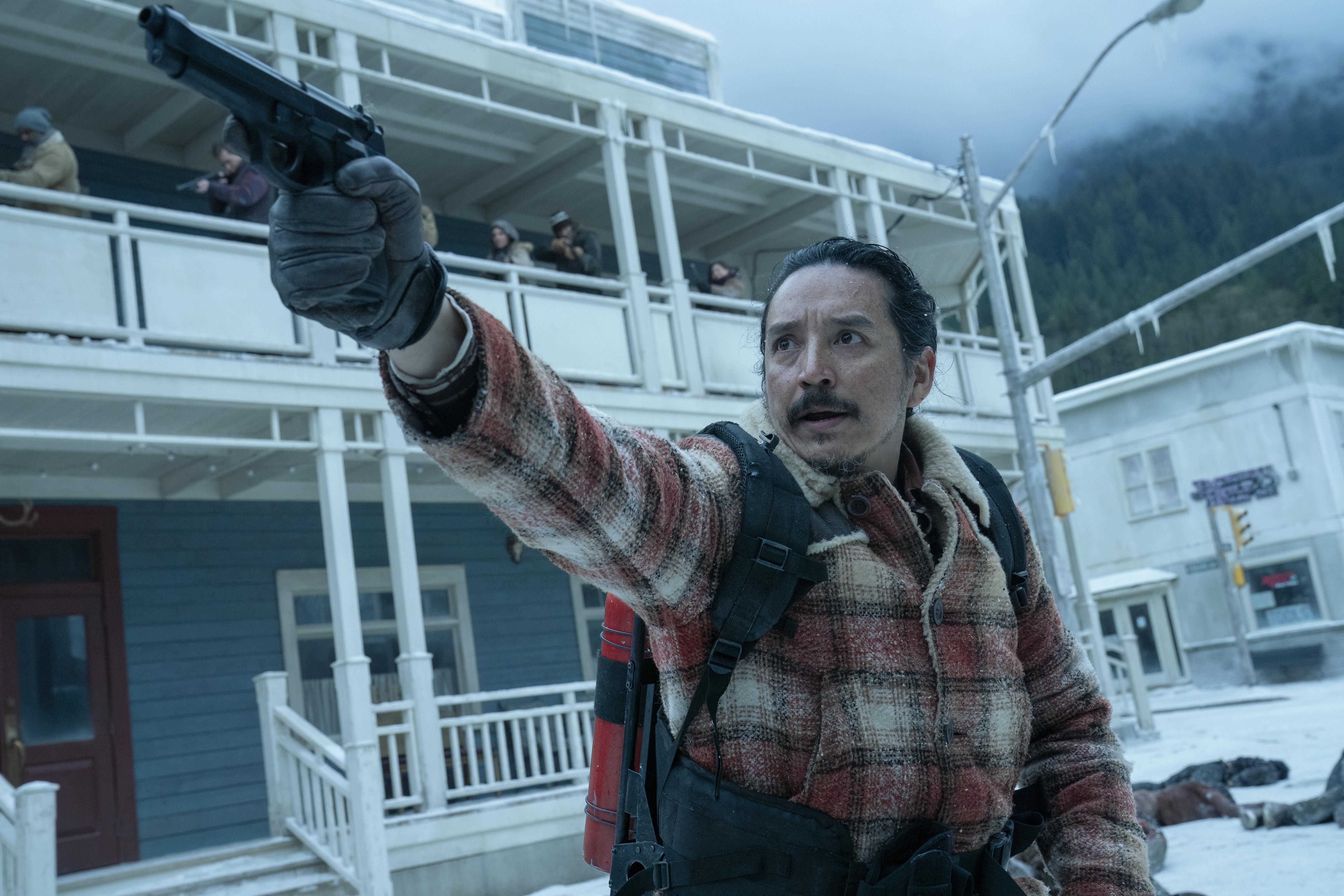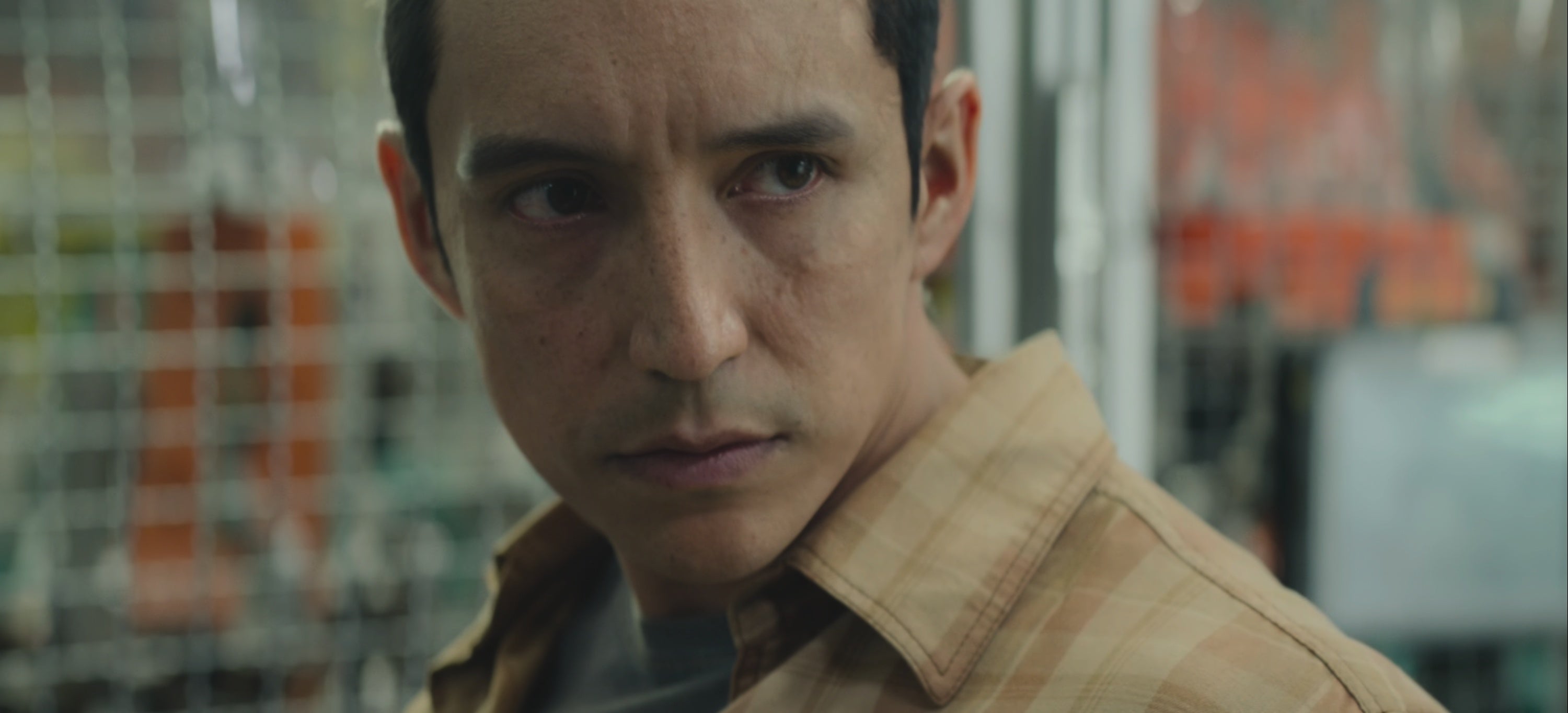
It was a dry day in October 2021, and Gabriel Luna was mooching around London Comic Con. A few months had passed since HBO had cast the twin stars of its lavish new video game adaptation The Last of Us – ex-Game of Thrones favourites Pedro Pascal and Bella Ramsey – and a randomer at the convention posited her choice to play Tommy, the brother of Pascal’s jaded apocalypse survivor Joel Miller.
“I remember this voice from the void being like, ‘You know who should play him? Gabriel Luna.’ I never thought twice of it,” Luna chuckles. “But that kid had some incredible foresight. She should go into casting.”
It is now four years later, and Luna is back in London, sitting across from me beside the window of a Soho hotel room. The 42-year-old actor is here to talk about the second season of The Last of Us, in which he plays – you guessed it – Tommy. There’s something robustly confident about Luna – maybe it’s the glass of neat mezcal he’s sipping. Or the way he shakes my hand twice before the interview begins, throwing in a sort of congenial, bro-y dap for good measure.
Luna had been kicking around the industry for a while before The Last of Us, appearing in films such as the Jack Black-Richard Linklater dramedy Bernie (2011) and the second series of True Detective in 2015. He first rose to prominence playing Ghost Rider in the Marvel TV series Agents of S.H.I.E.L.D., and went on to portray the mechanical villain of the 2019 Arnold Schwarzenegger sequel Terminator: Dark Fate. (“Critically, people really liked it... it made like $300m, which was considered a huge failure,” he says, rolling his eyes.)
The Last of Us, though, seems set to burnish Luna’s reputation further. He featured briefly in the first season, which debuted to effusive reviews back in 2023, but returns to the Emmy-winning drama this month with a far meatier part.
Luna hadn’t played the Last of Us video game when he was offered the part of Tommy – but quickly found himself blasting through the acclaimed 2013 release, a deeply human story of grief and fatherhood in a world overrun by zombie-like “infected”. “I finished it about three days before I shipped out to Calgary to film,” he recalls. “And then [series showrunner Craig Mazin] sent me all the scripts.”
Among these was the script for episode three, “Long, Long Time”, the heartbreaking standout from season one, which depicted a decades-spanning love affair between characters played by Nick Offerman and Murray Bartlett. “I read it on the plane and cried my eyes out in front of a bunch of people,” Luna says. “It was so beautiful, even in black and white.”
Season two, a revenge story and road-trip narrative that places much of the spotlight on Ramsey’s jaded teenager Ellie, gives Luna plenty to do. Tommy goes through some of the rawest human emotions: grief, anger, despair. And as the emotional stakes escalate, so does the spectacle. Episode two, which aired earlier this month, features an extended battle sequence as “infected” descend upon the snowy human settlement of Jackson, Wyoming.
“It’s more like we were shooting a big blockbuster feature,” Luna says. “That episode took a month and a half to shoot. So many feature films, both independent and studio, are shot [over that amount of time]. We spared no expense to maintain the quality that people who watch HBO on Sunday nights are expecting.”
With streaming having unmoored viewers from a rigid weekly schedule, HBO’s famed Sunday night slot is now more symbolic than anything. But The Last of Us is nonetheless part of a storied lineage that includes seminal TV series such as Succession, Game of Thrones, The Sopranos and Sex in the City. Despite the show’s grounding in an ostensibly low-prestige genre – zombie fiction – Luna argues that The Last of Us deserves to be spoken of in the same breath. (Fittingly, it was Succession veteran Mark Mylod who helmed its flagship second episode.)

Luna explains that Mazin, previously known for writing the gushingly received miniseries Chernobyl, would insert subtext directly into the screenplay – double meanings in unspoken parentheses. “It’s this really unique thing where he writes in a lot of subtext. It’s very Billy Shakespeare of him,” he says, winkingly. “I haven’t really seen it done [so explicitly] a whole lot in other writers’ work.”
He continues: “But because [Mazin] writes every letter of every word of every script, you don’t lose the throughline. A character won’t say something in episode six that sounds like it’s coming from a different voice. Oftentimes when you deal with shows that have large writers’ rooms, you start to get a sense that there’s a disconnect between the character’s past and where they’re going.”
He doesn’t name and shame any productions in particular, but Luna’s had his fair share of experience in more conventional TV environments. There was Matador, in which he played a star footballer who lives a double life as a CIA agent. There was Agents of S.H.I.E.L.D., a spin-off from Marvel’s Avengers films spearheaded by Joss Whedon; Luna joined that series in 2016, portraying Robert Reyes, aka Ghost Rider, the biker whose head sometimes turns into a flaming skull. There were a handful of one-off appearances in shows such as Prison Break and NCIS: Los Angeles. Then there was 2023’s FUBAR, which reunited Luna with Arnie for an eight-episode action comedy.
At times during our conversation, Luna’s phrasing takes on a sort of Old Testament grandeur. “I hope to embody the qualities of both lion and lamb,” he muses. “The strength and the power of a lion, but the tenderness and sensitivity of a lamb.
“That was my approach to The Last of Us, and to Terminator. Do you want to be a wrecking ball like [Schwarzenegger’s] T-800? Or a cold sword, like the T-1000 [Robert Patrick’s liquid-metal baddie in T2: Judgment Day]? I was always saying: I’m like the Ted Bundy of Terminators.” (Ok, maybe it’s not that biblical.)
In America, this wedge is being driven between everyone. What’s great about ‘The Last of Us’ is that everyone is represented. Gabriel Luna
Luna was born in Austin, Texas, in 1982, three months after his father died aged just 20. His mother was widowed at 15 years old; Luna was raised by her and his grandmother. (“We were pretty poor,” he recalls.) Yet it was his father who inspired his acting career; he took on his first role, a starring part in a school play, after discovering a VHS video of his late dad acting in a church play that he had also written and directed.
In an Instagram post shared back in January, Luna wrote that he is now more than twice the age his father was when he died, noting: “I’ve always held the belief that his soul is hitching a ride with me as I move through life.”

You get the sense that Luna is a fighter. As an actor of Mexican descent, he has constantly had to justify his presence in the industry in a way that white actors have not. “When I was playing Robert Reyes, the Ghost Rider who was a Mexican-American version of the character, people had problems,” he says. “When I did the Terminator, which was a dark-skinned version of it, people had problems – which made no sense, because it’s a robot. Why wouldn’t the robot being sent to Mexico City, to infiltrate the local populace, look like the local populace? People don’t think logically.
“And then,” he continues, “when Pedro [Pascal] and I were cast in The Last of Us, there was a lot of outcry about ‘Why don’t they look like their [white] video game counterparts?’ I’ve always taken it as a challenge.” With the second season now well underway, the voices of any bigoted dissenters have been well and truly drowned out by thundering praise.
Luna takes a moment, before we wrap up, to heap praise on his co-stars Pascal (“You realise there’s so many, so many more layers underneath what he’s doing”) and Ramsey (“They’re an absolute dynamo – someone born to do it. I remember watching them in Game of Thrones and thinking, ‘That kid acts like they’re nine feet tall’”).
He shakes my hand for a third time, and we exchange our goodbyes – but not before a final word on the series. “In America, this wedge is being driven between everyone,” he says. “What’s great about The Last of Us is that everyone is represented. Everyone is forced to collide, and overlap, and live among each other. It’s not done in a way that’s this group or that group. It’s a story that forces you to consider things, that makes you ask questions.
“And that,” he adds, “is what great art does.”
‘The Last of Us’ can be streamed on Sky and NOW in the UK, with new episodes arriving every Monday



-1746593715-q80.webp)